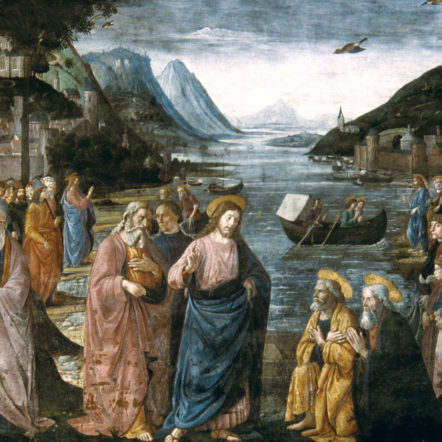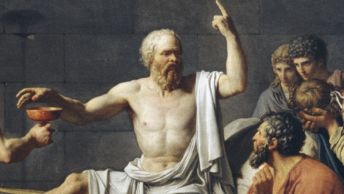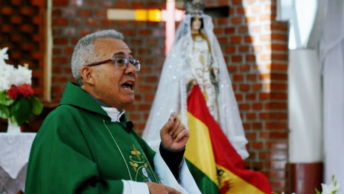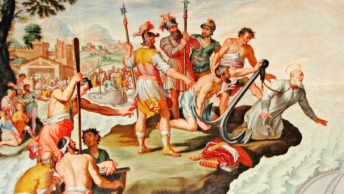I was exhausted. Thirty years ago, after having been coaxed into running for a political office, I had just spent a year campaigning. On election evening, the votes were tallied and the good people of the town where I lived rendered their collective wisdom upon me: Thumbs Down! In the aftermath of this long and definitive process, I found myself both disappointed and relieved. In the background, still others encouraged me: “Next time, you’ll win.”
The following day, I received a phone call from a nun who wanted to have lunch so she could “tell me a few things.” A few days later, we met and the first words out of her mouth were: “I want you to know that I didn’t vote for you because my prayer life revealed that politics was not your vocation.” Upon hearing her words, I remember becoming angry inside and thinking: “How could you, a friend, not vote for me? And who are you to give me insights regarding my life’s direction?” She continued: “Now I know you are a businessman and that you’ve just begun teaching part-time at a local university. God wants you to know that you need to stay with that. Also, I think that being around young people will be good for you; they’ll make you laugh and keep you young.” I’ll tell you, for these past three decades, my friend’s words have remained with me. Not just because she was right about teaching, but most importantly, because through her strong and intimate relationship with God, and the Wisdom that He had shared with her, she was right about my vocation. To this day, I thank her for boldly telling me what I didn’t want to hear. Had that political door opened for me, it might have shut a door on my vocation to the diaconate. So, I am grateful.
Along the way, each of us have been provided Wisdom by our parents, grandparents, friends, and pastors. On this 28th Sunday in Ordinary Time, it is right to thank God for sending them into our lives so that we might be led in the right direction. Our readings today provide a slightly different focus, however. Rather than reflecting upon the actions of others, the focus is upon you and me— and our relationship with God.
In the Book of Wisdom (7:7-11), Solomon’s prayer sets things in motion: “I prayed, and prudence was given me; I pleaded, and the spirit of wisdom came to me.” Once he surrendered his life to God and experienced the “riches” that only He can provide, everything was different. The same goes for us. Once we begin to see things through this new lens, our “must haves” are no longer. What once came first no longer does. Our focus on the Kingdom of God begins to dominate and captivate our daily lives. The riches of God come first! Our prayer and relationship with God leads us to love our neighbor as ourselves. Being “rich” comes to mean something else. With newly opened eyes, we begin to ask whether certain activities in our lives will lead us to the gates of the Kingdom of God. If they don’t, out they go.
In the Letter to the Hebrews (4:12-13), we are reminded that God’s word is living and active and effective and sharper than any two-edged sword. As we enter more deeply into relationship with the Lord, we surrender to His Divine Will so that He truly becomes Lord of our lives. He begins to show us doors we can walk through that we would once find impossible. Archbishop Fulton J. Sheen echoes this when he says that “Whenever we attempt to do what we know to be the Master’s will, a power will be given us equal to the duty.”
All of this leads us into the Gospel of Mark (10:17-30). There, we witness a dialogue between Jesus and a wealthy man who, objectively, is following the commandments. In kneeling before Jesus and asking him the eternal question, it is though he is looking for affirmation. He certainly believes that Jesus will give him a public thumbs-up. But Jesus knows there is something lacking. And just what is that? A willingness to abandon his earthly riches for a life in and with Jesus. Unable to part with these, the rich man bows his head and walks away.
In thinking about all of this, I am reminded of a friend who once confided that when she prays before the Blessed Sacrament or is about to receive Him in Holy Eucharist, her prayer is from the Lord’s Prayer, that “thy Will be done.” Each time, however, she hopes He won’t ask her for too much because she rather likes the present rhythm of her life.
A parting thought. As we know, the times we are living in are rough. Culturally, we have fallen a long way from espousing Godly values. Given this, it is easy to point fingers at others and say “You are the problem.” So, I leave you with something to ponder. Imagine that at this very moment, Jesus walked up to us. Because He is God, He looks at our face and deeply into our eyes. Without saying a word, He knows everything about us. After a long silence, however, He begins to speak and asks us the most probing questions we’ve ever been asked: Am I first in your life? Am I the Center of your life? Will you be my disciple? Will you follow me—right here, right now?
What would we say?








